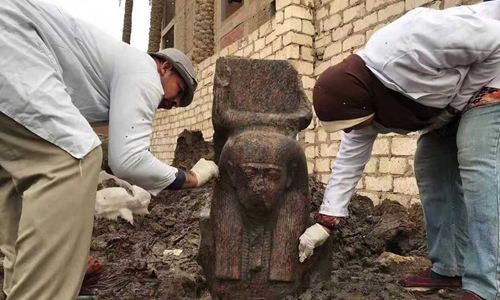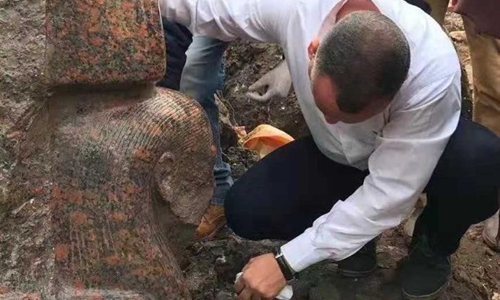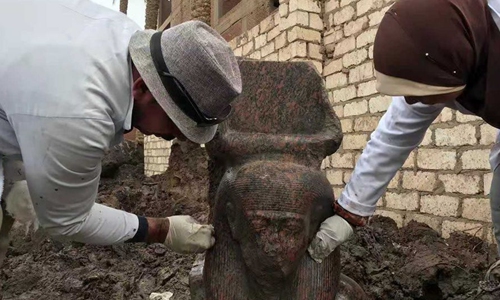HOME >> WORLD
Egypt unearths rare statue of King Ramses II near Giza pyramids
Source:Xinhua Published: 2019/12/12 8:59:04

Egypt discovers a rare statue of King Ramses II during excavations near Giza pyramids west of the capital Cairo. (Xinhua/Egyptian Ministry of Antiquities)
Egyptian Ministry of Antiquities announced on Wednesday that it has discovered a rare statue of King Ramses II during excavations near Giza pyramids west of the capital Cairo.
In a statement, the ministry said that the statue was unearthed during excavation works the ministry's teams started last week inside a piece of land owned by a citizen near the great temple of Ptah in Mit Rahina area.
The ministry said that the land owner was arrested earlier in December while stealthily carrying out excavations at his land.

Egypt discovers a rare statue of King Ramses II during excavations near Giza pyramids west of the capital Cairo. (Xinhua/Egyptian Ministry of Antiquities)
Mostafa Waziri, secretary-general of the Supreme Council of Antiquities, said an archaeological rescue mission discovered the upper part of a rare pink granite "Ka" statue of King Ramses II, which is a type of ancient Egyptian statues intended to provide a resting place for the Ka (life-force or spirit) of the person after death.
"This discovery is considered one of the rarest archaeological discoveries. It is the first ever Ka statue made of granite to be discovered. The only Ka statue that was previously found is made of wood and it belongs to one of the kings of the thirteenth dynasty of ancient Egypt," Waziri told Xinhua.
The discovered part of the statue is 105 cm high, 55 cm wide and 45 cm thick, Waziri said, adding that it is depicting King Ramses II wearing a wig and a crown with "Ka" sign.

Egypt discovers a rare statue of King Ramses II during excavations near Giza pyramids west of the capital Cairo. (Xinhua/Egyptian Ministry of Antiquities)
Ramses II, also known as "Ramses the Great," was the third pharaoh of the 19th dynasty. He ruled ancient Egypt about 3,300 years ago, leaving behind a rare legacy of monuments including his well-known great temple in the Nubian village of Abu Simbel village in Aswan province in southern Egypt.
As one of the most ancient civilizations, Egypt has been working hard to preserve its rich archaeological heritages.
The North African country has witnessed several large-scale archeological discoveries this year in different parts of the country, including Pharaonic tombs, statues, coffins and mummies.
Posted in: AFRICA